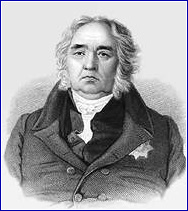The directory «Plots»
Krylov (Êðûëîâ) Ivan Andreevich
(1769—1844)

Ivan Andreyevich Krylov was a famous Russian fabulist. Ivan Krylov was born in Moscow, but spent his early years in Orenburg and Tver. His father, a distinguished military officer, died in 1779. Young Krylov was left with no fortune, only to be brought up by the exertions of a heroic mother. In the course of a few years his mother removed to St.Petersburg, in the hope of securing a government pension. There, Krylov obtained a post in the civil service, but he gave it up immediately after his mother's death in 1788. Already in 1783, he had sold to a bookseller a comedy of his own composition, and by this means had procured for himself the works of Moliare, Racine, Boileau; probably under the influence of these writers, he produced Philomela, which gave him access to the dramatic circle of Knyazhin. Several attempts Krylov made to start a literary magazine met with little success; but, together with his plays, they served to make the author known in society. For about four years (1797-1801) Krylov lived at the country seats of Prince Sergey Galitzine, and when the prince was appointed military governor of Livonia he accompanied him as official secretary. Of the years which follow his resignation of this post little is known, the common opinion being that he wandered from town to town under the influence of a passion for card-playing. Before long he found his place as a fabulist, the first collection of his Fables, 23 in number, appearing in 1809. From 1812 to 1841 he held a congenial appointment in the Imperial Public Library first as assistant, and then as head of the Russian books department.
Honors were showered upon Krylov while he yet lived: the Russian Academy of Sciences admitted him a member in 1811, and bestowed upon him its gold medal; in 1838 a great festival was held under imperial sanction to celebrate the jubilee of his first appearance as an author; and the emperor assigned him a handsome pension. Before his death about 77,000 copies of his Fables had found sale in Russia; and his wisdom and humor had become the common possession of the many. His fables for the most part struck root in some actual event, and they told at once by their grip and by their beauty. Though he began as a translator and imitator he soon showed himself a master of invention, who found abundant material in the life of his native land. To the Russian ear his verse is of matchless quality; while word and phrase are direct, simple and eminently idiomatic, color and cadence vary with the theme. Krylov's statue in the Summer Garden is one of the finest monuments in St.Petersburg.
Hungary, 1960, The Fox and The Raven
Poland, 1968, The Raven and the Fox
Russia, 1999, Portrait of Pushkin
USSR, 1944, Ivan Krilov
USSR, 1944, Ivan Krilov
USSR, 1957, Nothern bone-carving
USSR, 1959, Ivan Krilov, «The Wolf on a kennel»
USSR, 1969, Ivan Krilov
USSR, 1976, «Fastidous Fiansee»
USSR, 1969.02.13,  Leningrad. Birth Bicentenary of Krilov
Leningrad. Birth Bicentenary of Krilov
USSR, 1969.02.13,  Moskow. Birth Bicentenary of Krilov
Moskow. Birth Bicentenary of Krilov
USSR, 1984.02.13,  Moskow. 215th Birth Anniv of Krilov
Moskow. 215th Birth Anniv of Krilov
Russia, 2004,  250th birth anniv of Shishkov
250th birth anniv of Shishkov
USSR, 1959,  Ivan Krilov
Ivan Krilov
USSR, 1960,  Krilov's monument in Kalinin
Krilov's monument in Kalinin
USSR, 1969,  Krilov monument in Kalinin
Krilov monument in Kalinin
USSR, 1975,  Miniature book of Krilov
Miniature book of Krilov
USSR, 1978,  Krilov monument in Leningrad
Krilov monument in Leningrad
USSR, 1984,  215th Birth Anniv of Ivan Krilov
215th Birth Anniv of Ivan Krilov
USSR, 1971.09.23,  Detail of monument «Millenium of Russia»
Detail of monument «Millenium of Russia»
USSR, 1972.01.18,  Krilov monument in Kalinin
Krilov monument in Kalinin
USSR, 1972.10.18,  Krilov monument in Leningrad
Krilov monument in Leningrad
USSR, 1973.07.18,  Krilov monument in Kalinin
Krilov monument in Kalinin
USSR, 1974.10.28,  Krilov monument in Leningrad
Krilov monument in Leningrad
USSR, 1977.07.21,  Krilov monument in Kalinin
Krilov monument in Kalinin
USSR, 1986.02.10,  Wood statues from «Quartet»
Wood statues from «Quartet»
USSR, 1988.03.24,  Krilov monument in Kalinin
Krilov monument in Kalinin